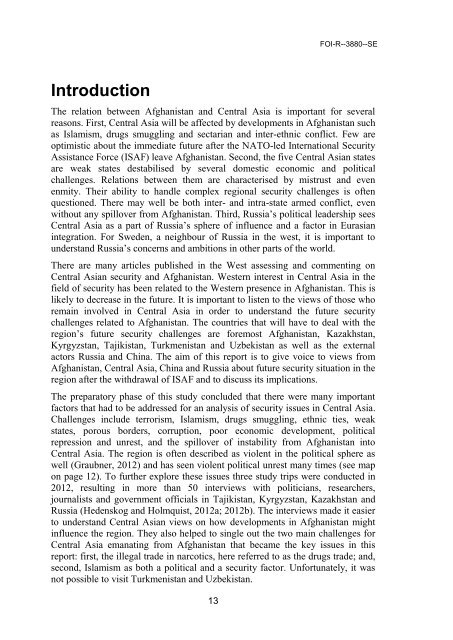foir_3880
foir_3880
foir_3880
Create successful ePaper yourself
Turn your PDF publications into a flip-book with our unique Google optimized e-Paper software.
FOI-R--<strong>3880</strong>--SE<br />
Introduction<br />
The relation between Afghanistan and Central Asia is important for several<br />
reasons. First, Central Asia will be affected by developments in Afghanistan such<br />
as Islamism, drugs smuggling and sectarian and inter-ethnic conflict. Few are<br />
optimistic about the immediate future after the NATO-led International Security<br />
Assistance Force (ISAF) leave Afghanistan. Second, the five Central Asian states<br />
are weak states destabilised by several domestic economic and political<br />
challenges. Relations between them are characterised by mistrust and even<br />
enmity. Their ability to handle complex regional security challenges is often<br />
questioned. There may well be both inter- and intra-state armed conflict, even<br />
without any spillover from Afghanistan. Third, Russia’s political leadership sees<br />
Central Asia as a part of Russia’s sphere of influence and a factor in Eurasian<br />
integration. For Sweden, a neighbour of Russia in the west, it is important to<br />
understand Russia’s concerns and ambitions in other parts of the world.<br />
There are many articles published in the West assessing and commenting on<br />
Central Asian security and Afghanistan. Western interest in Central Asia in the<br />
field of security has been related to the Western presence in Afghanistan. This is<br />
likely to decrease in the future. It is important to listen to the views of those who<br />
remain involved in Central Asia in order to understand the future security<br />
challenges related to Afghanistan. The countries that will have to deal with the<br />
region’s future security challenges are foremost Afghanistan, Kazakhstan,<br />
Kyrgyzstan, Tajikistan, Turkmenistan and Uzbekistan as well as the external<br />
actors Russia and China. The aim of this report is to give voice to views from<br />
Afghanistan, Central Asia, China and Russia about future security situation in the<br />
region after the withdrawal of ISAF and to discuss its implications.<br />
The preparatory phase of this study concluded that there were many important<br />
factors that had to be addressed for an analysis of security issues in Central Asia.<br />
Challenges include terrorism, Islamism, drugs smuggling, ethnic ties, weak<br />
states, porous borders, corruption, poor economic development, political<br />
repression and unrest, and the spillover of instability from Afghanistan into<br />
Central Asia. The region is often described as violent in the political sphere as<br />
well (Graubner, 2012) and has seen violent political unrest many times (see map<br />
on page 12). To further explore these issues three study trips were conducted in<br />
2012, resulting in more than 50 interviews with politicians, researchers,<br />
journalists and government officials in Tajikistan, Kyrgyzstan, Kazakhstan and<br />
Russia (Hedenskog and Holmquist, 2012a; 2012b). The interviews made it easier<br />
to understand Central Asian views on how developments in Afghanistan might<br />
influence the region. They also helped to single out the two main challenges for<br />
Central Asia emanating from Afghanistan that became the key issues in this<br />
report: first, the illegal trade in narcotics, here referred to as the drugs trade; and,<br />
second, Islamism as both a political and a security factor. Unfortunately, it was<br />
not possible to visit Turkmenistan and Uzbekistan.<br />
13


